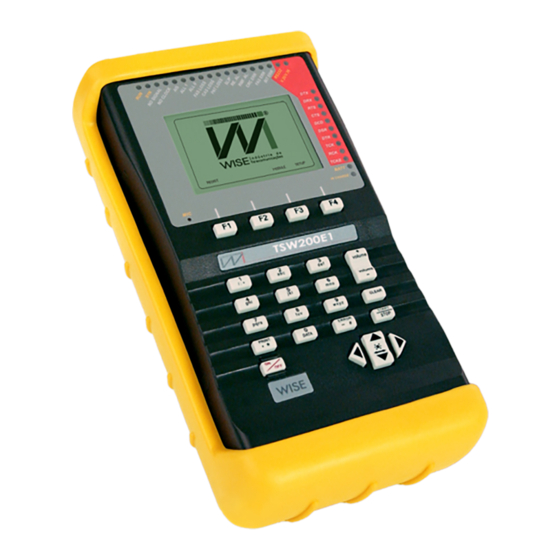
Summary of Contents for Wise TSW200E1
- Page 1 Operation Manual DTMF Annex to TSW200E1's Operation Manual Version: 1 Revision: 2 December/2008...
- Page 3 Copyright This manual was created by the Wise Telecommunications Industry team. No part or contents of this manual can be reprinted without written authorization of Wise Telecommunications Industry. Wise Telecommunications Industry reserves itself the right to alter its products, and the manual contents, at any time, without any prior warning, according to its own needs.
- Page 5 Summary 1 - Introduction ............................. 1 2 - DTMF Module Operation ....................... 2 2.1 - DTMF test Configuration ......................2 2.2 - Performing the DTMF test ...................... 3...
-
Page 7: Introduction
DTMF 1 - Introduction The TSW200E1 DTMF Module allows simulating the process of calling an end user using DTMF. The digits can be manually inserted using the equipment keyboard or automatically by means of a user-selectable number of up to 16 digits. The user can also edit the CAS pattern used and the following tone characteristics: active time, interval time between tones and tone level. -
Page 8: Dtmf Module Operation
INVERTED, where the bits are inverted. • Channel: Channel in which the equipment will initiate the calls. The next configuration screen, shown in the following figure, selects the parameters for the transmitted tones and CAS signalization. Wise Telecommunications Industry... -
Page 9: Performing The Dtmf Test
The test can be started after all the parameters have been chosen. To do this, simply press the <START/STOP> key at any of the two configuration screens. The running test presents a single screen, displayed in the following figure. Wise Telecommunications Industry... - Page 10 • Sending of a keyboard tone • Sending of the Speed Dial digits All data received are sent to the equipment loudspeaker. The data sent by the TSW200E1 during the call are the generated tones or audio entering the microphone. While the equipment sends no tone (or the silence of the interval between tones), any data entering the microphone are sent.



Need help?
Do you have a question about the TSW200E1 and is the answer not in the manual?
Questions and answers